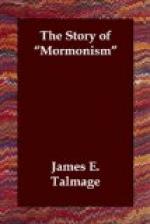Christ has been ordained to be judge of both quick and dead; he is Lord of living and dead as man uses these terms, for all live unto him. How then shall the dead receive the blessings and ordinances denied to them or by them neglected while in the flesh? “Mormonism” answers: By the vicarious work of the living in their behalf! It was this great and privileged labor to which the prophet Malachi referred in his solemn declaration, that before the great and dreadful day of the Lord, Elijah should be sent with the commission to turn the hearts of the fathers to the children and the hearts of the children to the fathers. Elijah’s visitation to earth has been realized. On the 3rd of April, in the year 1836, there appeared unto Joseph Smith and Oliver Cowdery, in the temple erected by the. Latter-day Saints at Kirtland, Ohio, Elijah the prophet, who announced that the time spoken of by Malachi had fully come; then and there he bestowed the authority, for this dispensation, to inaugurate and carry on this labor in behalf of the departed.
As to the fidelity with which the Latter-day Saints have sought to discharge the duties thus divinely required at their hands, let the temples erected in poverty as in relative prosperity—by the blood and tears of the people—testify. Two of these great edifices were constructed by the Latter-day Saints in the days of their tribulation, in times of their direst persecution,—one at Kirtland, Ohio, the other at Nauvoo, Illinois. The first is still standing, though no longer possessed by the people who built it; and no longer employed for the furtherance of the purposes of its erection; the second fell a prey to flames enkindled by mobocratic hate. Four others have been constructed in the vales of Utah, and are today in service, dedicated to the blessing of the living, and particularly to the vicarious labor of the living in behalf of the dead. In them the ordinances of baptism, and the laying on of hands for the bestowal of the Holy Ghost, are performed upon the living representatives of the dead.[6]
[Footnote 6: For a detailed treatment of Temples and Temple labor among the Latter-day Saints, including a study of the doctrine of vicarious labor for the dead, see “The House of the Lord, a Study of Holy Sanctuaries Ancient and Modern,” including forty-six plates illustrative of modern Temples; by James E. Talmage. Published by the Church: Salt Lake City, Utah; 336 pp.]
But this labor for the dead is two-fold; it comprises the proper performance of the required ordinances on earth, and the preaching of the gospel to the departed. Shall we suppose that all of God’s good gifts to his children are restricted to the narrow limits of mortal existence? We are told of the inauguration of this great missionary labor in the spirit world, as effected by the Christ himself. After his resurrection, and immediately following the period during which his body had lain in the tomb guarded




